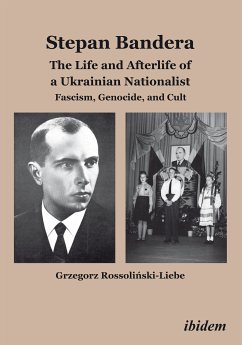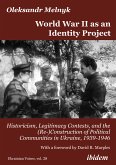"The Life and Afterlife of a Ukrainian Nationalist" is the first comprehensive and scholarly biography of the Ukrainian far-right leader Stepan Bandera and the first in-depth study of his political cult. In this fascinating book, Grzegorz Rossolinski-Liebe illuminates the life of a mythologized personality and scrutinizes the history of the most violent twentieth-century Ukrainian nationalist movement: the Organization of Ukrainian Nationalists and its Ukrainian Insurgent Army. Elucidating the circumstances in which Bandera and his movement emerged and functioned, Rossolinski-Liebe explains how fascism and racism impacted on Ukrainian revolutionary and genocidal nationalism. The book shows why Bandera and his followers failed—despite their ideological similarity to the Croatian Ustaša and the Slovak Hlinka Party—to establish a collaborationist state under the auspices of Nazi Germany and examines the involvement of the Ukrainian nationalists in the Holocaust and other atrocities during and after the Second World War. The author brings to light some of the darkest elements of modern Ukrainian history and demonstrates its complexity, paying special attention to the Soviet terror in Ukraine and the entanglement between Ukrainian, Jewish, Polish, Russian, German, and Soviet history. The monograph also charts the creation and growth of the Bandera cult before the Second World War, its vivid revivals during the Cold War among the Ukrainian diaspora, and in Bandera`s native eastern Galicia after the dissolution of the Soviet Union.
This important, heavily documented and rigorously researched book could not be published at a better time. Arguing that Stepan Bandera, leader of the radical faction of the Organization of Ukrainian Nationalists (OUN), was motivated by a fascist worldview, the author shows that the OUN s specific goal was to create an independent and ethnically homogeneous Ukraine, free of Russian-Bolshevik, Polish, and Jewish influence, and led by a charismatic dictatorial leader at the head of a single party. The author exposes the intimate links between the OUN and Nazi Germany as well as its violent ethnic cleansing of Poles in Western Ukraine and its collaboration with the Germans in the genocide of the Jews, all actions for which Bandera acted as the leading spirit even from his German imprisonment. Many Ukrainians will find this argument, meticulously documented and persuasively argued, deeply troubling. Yet it is a case that needs to be made and which this book accomplishes with such energy and breadth. Omer Bartov, History Professor at Brown University








